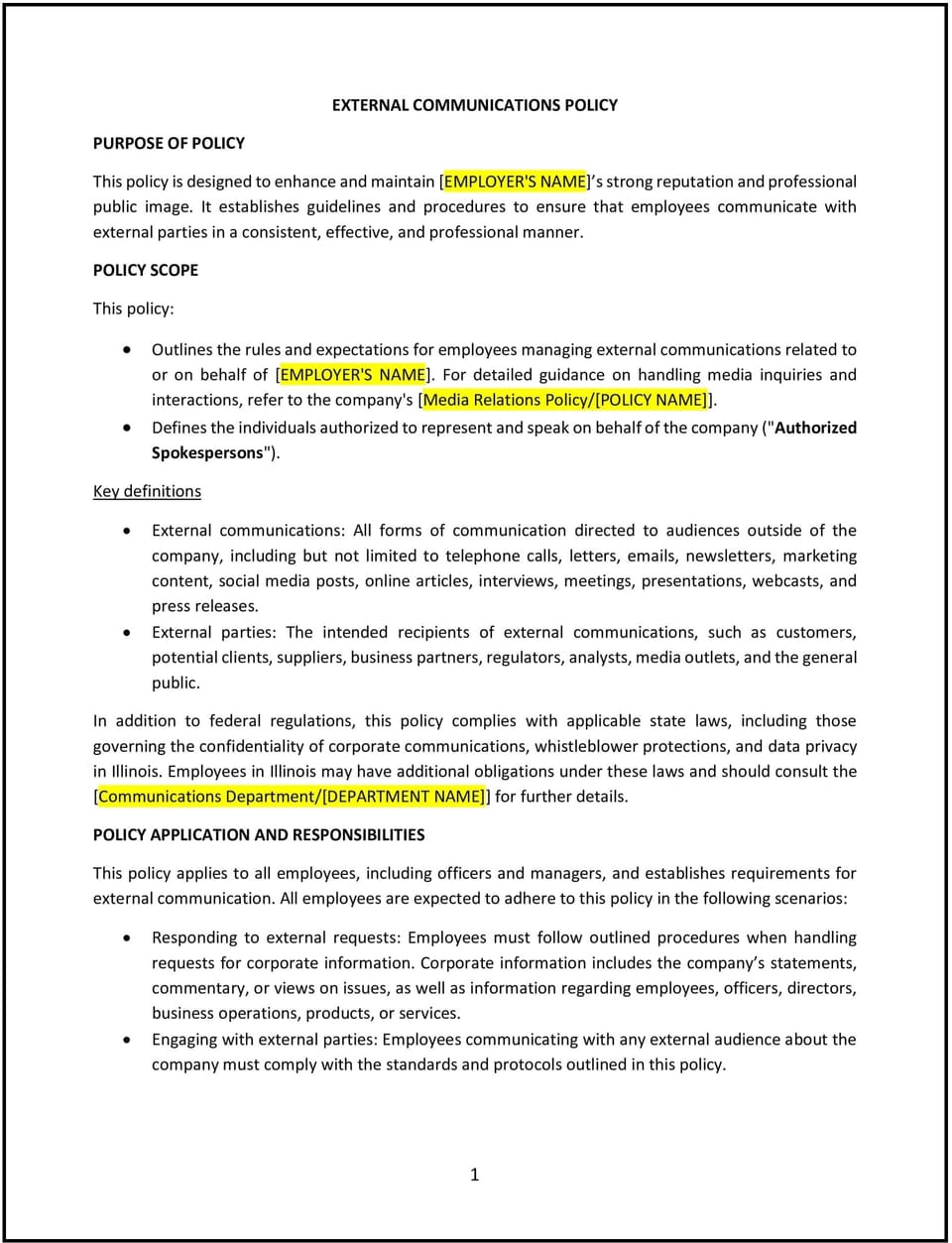External communications policy (Illinois): Free template

External communications policy (Illinois)
This external communications policy is designed to help Illinois businesses manage how information is shared with external audiences, including media, customers, and the public. It establishes guidelines for authorized communication, confidentiality, and brand consistency, ensuring that all external messaging aligns with company values and complies with Illinois laws.
By adopting this policy, businesses can maintain brand reputation, minimize risks, and ensure consistent and professional communication.
How to use this external communications policy (Illinois)
- Define authorized spokespersons: Specify which employees are authorized to speak on behalf of the company, such as executives, PR personnel, or designated team members.
- Outline communication channels: Clarify the approved methods for external communication, including press releases, social media, or direct correspondence.
- Address confidentiality: Prohibit the sharing of confidential or proprietary information without prior approval to protect company interests.
- Include media engagement guidelines: Provide procedures for responding to media inquiries, including directing reporters to authorized spokespersons.
- Establish brand consistency: Ensure that all external communications adhere to the company’s branding, tone, and messaging standards.
- Provide crisis communication protocols: Outline steps for managing communications during crises, such as appointing a crisis team and issuing approved statements.
- Require training: Offer training to employees on proper communication practices and how to handle external inquiries.
- Monitor compliance: Regularly review external communication practices to ensure alignment with this policy and Illinois laws.
Benefits of using this external communications policy (Illinois)
This policy provides several benefits for Illinois businesses:
- Protects the brand: Ensures consistent and professional communication that aligns with the company’s values and reputation.
- Reduces risks: Minimizes the potential for misinformation, unauthorized disclosures, or legal issues.
- Promotes accountability: Establishes clear guidelines for who can speak on behalf of the company and under what circumstances.
- Enhances compliance: Aligns with Illinois laws and industry standards for external communication.
- Streamlines messaging: Provides a structured approach to managing communication with external audiences.
Tips for using this external communications policy (Illinois)
- Communicate the policy: Share the policy with employees during onboarding and ensure it is included in employee handbooks.
- Train employees: Provide training on handling media inquiries, maintaining confidentiality, and avoiding unauthorized communication.
- Monitor social media: Establish guidelines for employees’ use of personal social media accounts when referencing the company.
- Develop a crisis plan: Prepare a detailed communication plan for managing potential crises or public relations issues.
- Update regularly: Revise the policy to reflect changes in Illinois laws, communication tools, or company practices.
Q: Who is authorized to speak on behalf of the company?
A: Only designated spokespersons, such as executives, PR personnel, or team leaders, are authorized to speak on behalf of the company.
Q: How should employees respond to media inquiries?
A: Employees should refer all media inquiries to the authorized spokesperson or PR team, as outlined in this policy.
Q: What types of information are considered confidential?
A: Confidential information includes proprietary data, trade secrets, financial records, and any other sensitive information that could harm the company if disclosed.
Q: Are employees allowed to discuss the company on social media?
A: Employees may discuss the company on social media only if it aligns with the guidelines in this policy and does not disclose confidential or proprietary information.
Q: What steps are included in the crisis communication plan?
A: The plan includes appointing a crisis team, preparing approved statements, and using designated channels to communicate with external audiences.
Q: How are external communications monitored?
A: The company may review external communications for consistency and compliance with this policy, including media releases and public statements.
Q: How often is this policy reviewed?
A: This policy is reviewed annually or whenever significant changes occur in Illinois laws, communication practices, or company needs.
Q: Does this policy apply to contractors and vendors?
A: Yes, contractors and vendors working with the company are expected to follow external communication guidelines as outlined in this policy.
This article contains general legal information and does not contain legal advice. Cobrief is not a law firm or a substitute for an attorney or law firm. The law is complex and changes often. For legal advice, please ask a lawyer.


